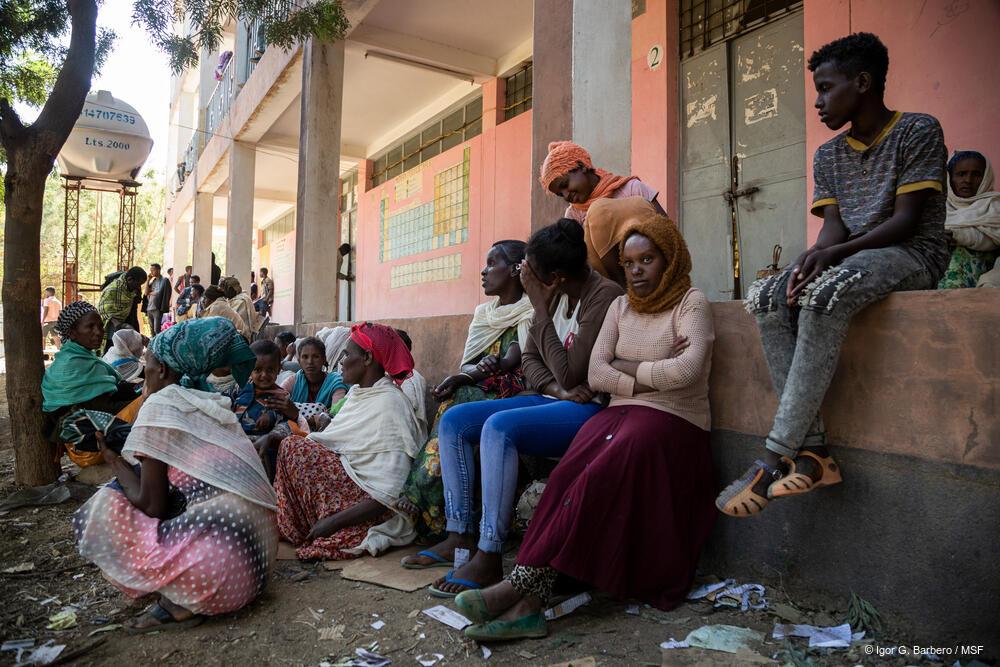MSF emergency coordinator Ozan Agbas describes the current situation.
What has the situation in Shire been like since the beginning of March?
In the first week of March, we started seeing large numbers of new arrivals. They arrived in buses from the Tekeze River, with very few belongings. They were physically and mentally exhausted. Most had been displaced two or three times in the Western region before reaching Shire.
They talked about atrocities they had witnessed or experienced. Some told us that they had been directly instructed to leave. Others said they received a piece of paper under their door at night, telling them to leave within 24 hours. Some were just afraid of what might happen. What was clear is that they did no longer feel safe.
They first went to the three existing IDP sites. Within a few days, there was a new site in a school. Three days later, this new school was already full. Now, after just a few weeks, there are 14 informal IDP sites in Shire, mostly in schools. We estimate that about 35,000 people are living in those sites. There are also an unknown number of displaced people living with their family members in Shire.
At the beginning, about 1,500 people arrived in Shire every day after crossing the Tekeze River. Our teams still see new people arriving daily. Some people stay in Shire, others continue to places like Axum where they have family members. We have heard that there are more people waiting to cross the Tekeze River.
Those who cannot afford the bus to Shire walk to Sheraro, the first bigger town east of the Tekeze River. Thousands of displaced people are now living in three schools there.
What are conditions of the displaced people like?
The biggest concern of the displaced people is food. There were some food distributions in Shire before, but the newest arrivals did not get anything yet. At the moment, there is no large-scale food distribution. Inadequate shelter is another issue. People live in congested conditions in classrooms in schools, they don’t have mattresses and blankets. Some people are sleeping outside, between the buildings. It gets cold in the evenings. We see a lot of respiratory issues due to the cold weather and the dire living conditions. There are also issues related to hygiene and access to clean water.
We urge other organizations to scale up their support as much as possible, as soon as possible. If we respond now, we can prevent a bigger disaster.
What is MSF most concerned about?
The current situation is a powder keg that is waiting to explode. With the rainy season approaching, we are worried about potential disease outbreaks such as acute watery diarrhoea, cholera, or malaria. We see malaria cases even now, and the rainy season will increase transmissions. The children are not well
nourished, and they will be the first ones who will be affected. We also expect an increase of respiratory illnesses because of the congested conditions in the shelters. Furthermore, immunizations have been interrupted for months. Public health facilities do provide vaccinations now, but as the number of new arrivals in Shire is so high, it is difficult to distribute vaccines to everyone. This could lead to disease outbreaks, such as measles.
There are also many protection-related concerns such as inter-communal dynamics, pressure from military actors, cases of sexual violence. There are many unaccompanied minors in the IDP sites. They are the most vulnerable ones, as well as disabled people. They are at the bottom when it comes to accessing humanitarian services, such as food distributions.
How has MSF responded to the increase of displaced people in Shire?
Since the arrival of the new wave of IDPs, we opened a third fixed clinic where we provide free primary and sexual-reproductive health care, as well as mental health services. We also have a mobile clinic team that visits the new sites, especially when new people arrive. Most of them have not had any access to medical care for months. We have built emergency latrines in most of the sites and have installed water tanks. MSF is also trucking drinking water to the Tekeze River to support people waiting for transportation to Sheraro or Shire. We have also distributed some hygiene and household items to newcomers and are preparing a larger distribution. We are doing all these activities to prevent disease outbreaks and improve hygiene conditions.
